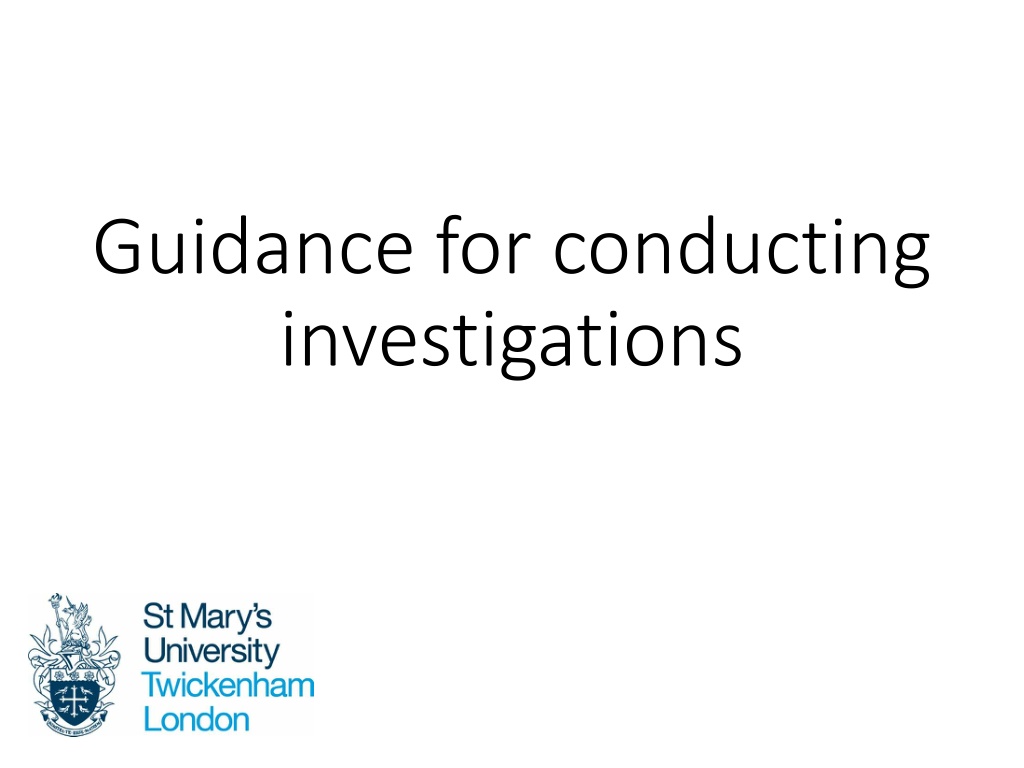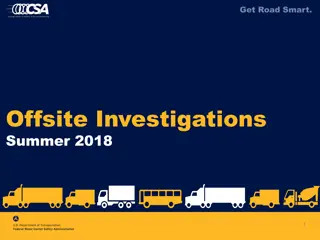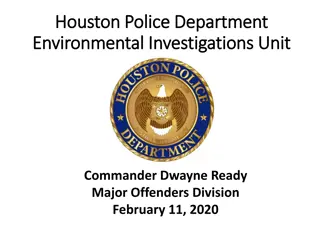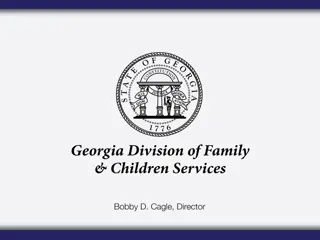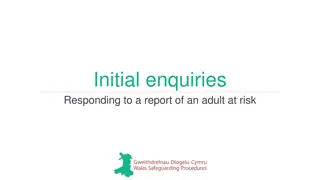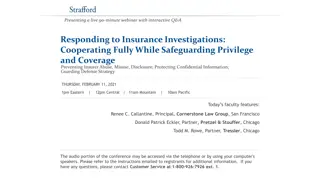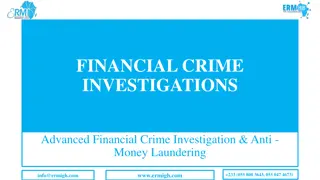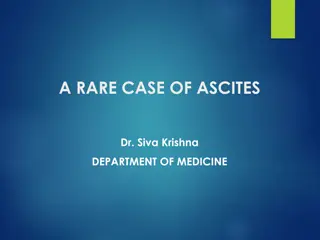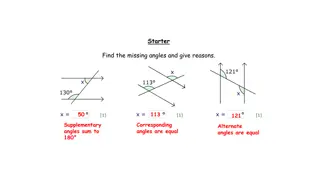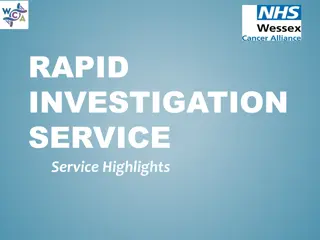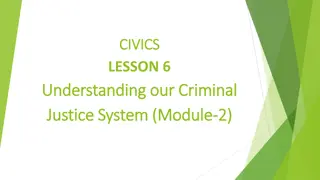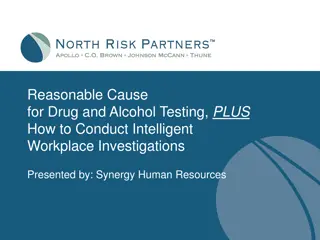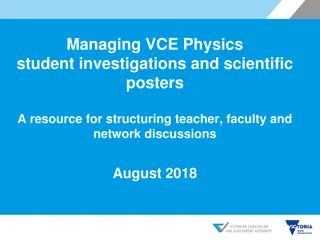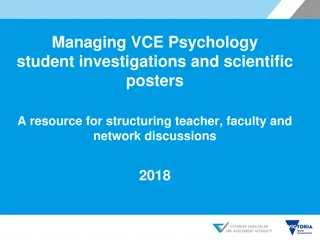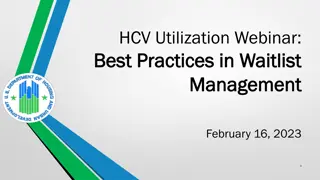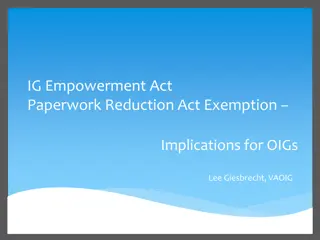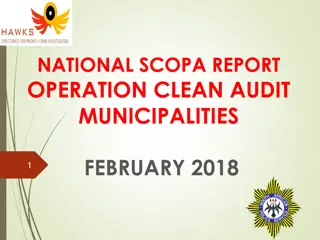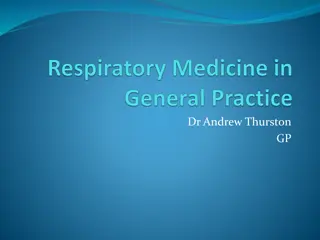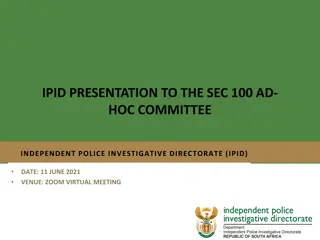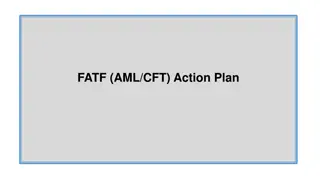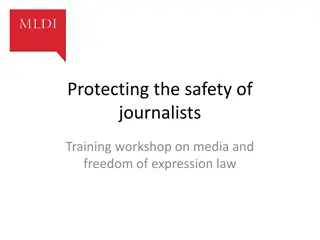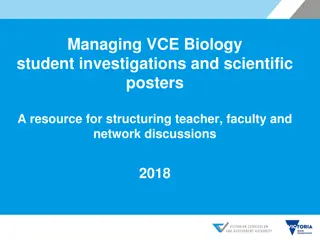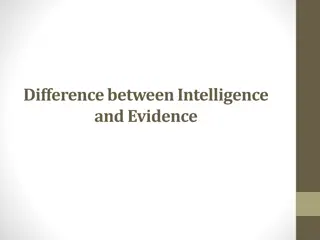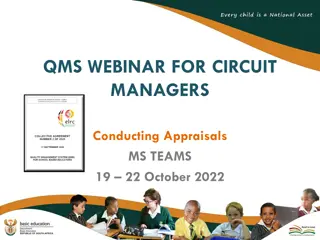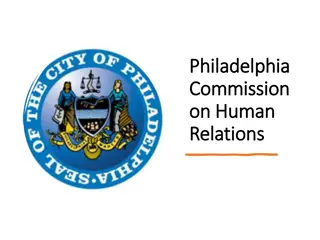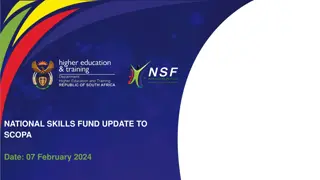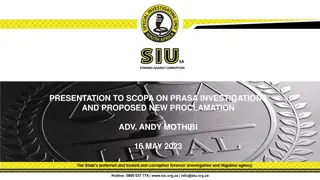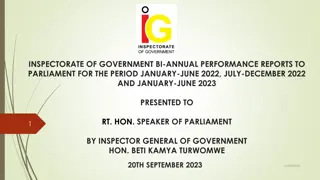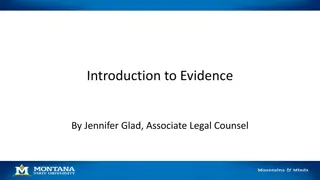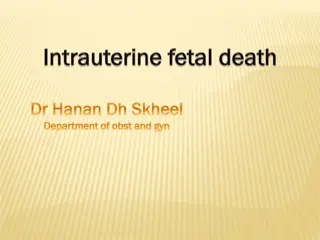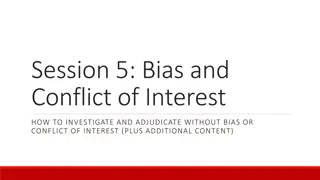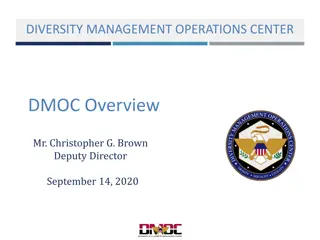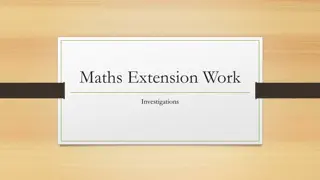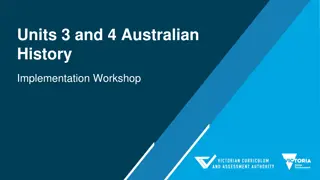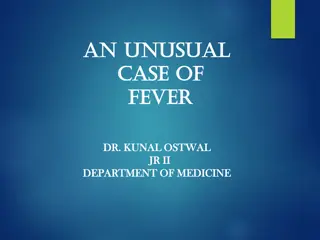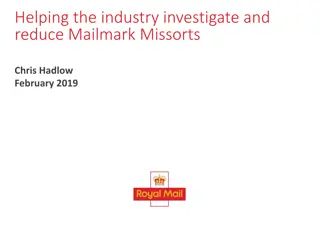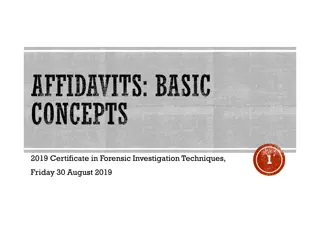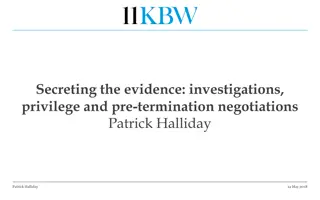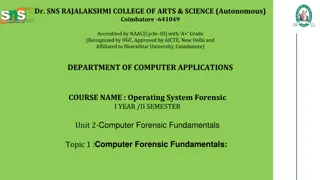Best Practices for Conducting Effective Investigations
Understanding the purpose, principles, and process of investigations is crucial for conducting fair and well-managed inquiries. Learn about the impact of improper investigations and follow a structured approach encompassing appointment of an investigating manager, defining scope, planning, evidence gathering, analysis, report writing, and next steps.
Download Presentation

Please find below an Image/Link to download the presentation.
The content on the website is provided AS IS for your information and personal use only. It may not be sold, licensed, or shared on other websites without obtaining consent from the author. Download presentation by click this link. If you encounter any issues during the download, it is possible that the publisher has removed the file from their server.
E N D
Presentation Transcript
Guidance for conducting investigations
Objectives The purpose ofan investigation The principles ofan effectiveinvestigation The investigation process The Investigating Manager Supportfromyour People Partner Suspension Planning an investigation Conducting investigation interviews GatheringEvidence The InvestigationReport Layoutand whatto include Making a decisionand recommendations Whathappens once an investigation is concluded This is based on investigations conducted into disciplinary matters, however the principlesand process are also applicable to grievance cases.
PurposeofanInvestigation An investigation is a fact-findingprocess to collect relevant information to fully consider thematter and make an informed decision. Itrequires theInvestigating Manager to: Consider evidence thatsupports theallegation(s) Consider evidence thatcontradicts the allegation(s) Establish facts Decide:Is there a case toanswer? Any recommendations
Theprinciplesofaneffective investigation An investigation should be: Rigorous Fair Structure Sensitive Transparent Consistent with people s rights Neutral Timely Working appropriate ground rules
The impact of getting it wrong TheInvestigationprocess is integral to the effective managementand resolution ofEmployee Relations cases. A poorly managed investigationcan have serious consequences: Increased risk of grievance or claimagainst theuniversity Increased compensation risk Negative impactonrelationships Time wasted to reinvestigate Notbeing able to take action
The investigation process 1. Appointment as investigating manager 2. Defining and agreeing the scope of the investigation 3. Planning the investigation 4. Conducting interviews and gathering evidence 5. Analysing and assessing information 6. Writing the investigation report 7. Next steps
1. Appointment as investigating manager The behaviours of an investigation manager should be: Impartial and neutral An active listener Able to demonstrate empathy Use appropriate questioning skills Embodies our values Maintains confidentiality
Impartiality and Neutrality Impartiality No bias for or against Acting fairly and consistently Listening equally to all No colluding or attributing blame Complying with policy and procedure and applying them consistently Neutrality Not making snap judgements Avoiding assumptions Managing your own feelings Putting your own values aside
Confidentiality Theinvestigationshouldbeconductedwiththeappropriate levelof confidentiality Theinvestigationcouldinvolvesensitivemattersandonlythosewho should knowforsupport/safeguardingpurposes shouldbeinformed TheInvestigatingManagershouldonlyinvolvepeopleintheprocess if theyare key to establishing the facts of the matter. Those involved are required to keepthematter confidential LineManagers andFaculty/DirectorateLeaders maybe informedofthe investigationinorder tosupporttheindividual andtheprocess
HR Support HR willprovidesupportwith: Agreeingthescope oftheinvestigation Ensuringyouareawareofandusetherelevantpolicies/proceduresforthe case Assistingwithplanningthe Investigation Providingyouwithtemplates(Invitation/Outcomeletters& Report) Adviseonbestpractice HR willnot: Make decisionsfor youor trytoinfluenceyour decision Writeyour report/outcomes
Suspension Incertain situationsitmay be decided thatsuspension withpay is necessary whilethe investigationis carried out,for example when: Working relationships havebrokendown Theemployeecouldinterferewithevidence There is a risk toan employee sHealth& Safety There is a risk ofdamage topropertyor thebusiness ofan employeeor the organisation Suspension with pay should only be used after careful consideration as a last resort and should be regularly reviewed to ensure itis not unnecessarilydrawn out.
Defining the scope of the investigation What is the issue/ matter to be investigated What policies/procedures should be referred to? What decisions/ recommendations will you be making? The above points will feed into the focus of the investigations.
Terms of reference to be agreed Who has commissioned the investigation? What is the nature of the allegation? Who has made the allegation and against whom? How many potentialwitnesses? What procedure applies? What level of disclosure will be given to those involved in the Investigation? Remit: facts, findings and recommendations? To whom willthe report be presented? Any other part to play in subsequent proceedings?
Terms of reference why does it need to be agreed? Clarifies the remit of the Investigating Manager Clarifies how to present findings Ensures that all key facts are responsibly investigated Ensures that the Investigating Manager only collects information and facts relevant to the matter Minimises any negative impact on morale caused by the investigation Minimises disruption to the daily business needs of the organisation Aids the timely completion of the investigation
Consideration for planning the investigation Who do you need to speak to? What evidence do you need to gather? What policies/procedures should be followed/ Where will the investigation interviews take place? Do you have a note taker? Do you require HR attendance at the investigation? Block time for the interviews/ gathering information and writing the report.
Holding a timely investigation AnInvestigatingManagershouldbecommittedtodedicatingtimetocarry outthe Investigation. Itisimportantthat the Investigationiscarriedoutinatimelyfashionto: - - - Ensureaccuraterecollectionofthoseinvolved Minimiseanynegativeimpactofthe wellbeingofthoseinvolved Minimisedisruptiontothe organisation sdailybusiness needs Investigationsmaytakemoretimewhere: - - - Itisdifficulttoscheduleinterviewsduetoworkloadandschedules Thecaseisofamorecomplexnature Thereareanumber ofwitnesses tointerviewinorder tofullyestablishthefacts ofthecase Whilstaninvestigationshouldbecompletedas quicklyas practicable,italsoneedsto be sufficiently thorough and fair . Any delays (and the reasons for these) should be communicatedtothoseinvolved andincluded inthereport.
Preparing for interviews HaveyouorganisedHR support(ifrequired)? Haveyousentaninvitationtotherelevantparties covering:righttobeaccompanied (if appropriate),policy onrecordingdevices,detailsofthose inattendanceandtheir role in the meeting, reason for the interview and the university procedure to be followed? Haveyouremindedthose involvedoftheneedfor confidentiality? Do youhaveanappropriateroom bookedfor sufficienttime? Do youhaveanotetaker? Haveyoupreparedquestionsso thatyoucover allaspects ofthemattertobe investigated?
Conductinginterviewsandgathering evidence Roles and responsibilities The investigating manager: Asks questions, listens and establishes facts The interviewee: Contributes information, complies with the process The representative: Supports colleague, able to sum up on their behalf and confer. Not able to answer on behalf of colleague. The note taker: Captures what is being discussed, asks for pauses in the meeting if required. HR: Provides HR procedural or policy advice.
At the start of the meeting Explain: Who is presentand why The role oftheInvestigating Manager The rightto be accompanied (ifappropriate) The process and procedures to be followed and considered The purpose ofthemeeting The need for confidentiality The policy onrecording devices Thenotes of themeetingwillbe used inthe Investigation Report Who willsee the report
Listening during the meeting Treat every situation as though you know nothing Hear each persons account as it is for them, accept it will be different Encourage maximum disclosure from the speaker Avoid making assumptions Centre yourself and be present
During the meeting Ask questions to gather the facts Probe politely Record responses and refusals to respond Seek to clarify Look for corroboration
Take notes ArecordoftheInterviewshould capture: Date,timeandplaceofinterview Names androles ofthose present An accuraterecordoftheinterview-NOTVerbatimbutcapturingkey points Anyrefusaltoanswer a question Start,finishandadjournmenttimes
Active listening Research shows thatwe onlyremember25-50% of whatwehear. Active listening is consciously making the effort to hear not only the words but also allows you to absorb the complete message being communicated.
AppropriateQuestioningskills Questions should be: Clear, concise, relevant andunderstandable totheinterviewee Asked withdelicacyandempathywhenthesubject is ofa sensitive nature Tryto: Start withopenquestions toallowtheperson toexpress themselves Use promptquestions toencourage person tocontinue intheirownwords Focused questions establish examplesanddetail Closed questions provide specificdetailsandestablish meaning Use probingquestions,notprying- why do you need toask this? Be responsive toreactions- ifthequestions are affecting rapport,ease pacing and refocus Do not stray into irrelevancies suchas character analysis Avoid blamingquestions this is nota courtoflaw
Questioning skills Open So talk me though what happened In your own words describe everything you can remember about How did that affect you? Tell me about Probing Tell me more What happened next? Could you give me an example And then? Focused When you say what do you mean? Could you describe your reaction. Other people s reaction? What s been your relationship with this person? How have things changed?
Empathy and influence Using empathy and influencing skills as an Investigator will enable you to effectively gather relevant information to help you to establish the facts of the case. Demonstrating empathy in an investigation: Open non-verbal attention Establish rapport and trust You reflect information accurately Acknowledge what is important for them Reflect back feelings as they are for them Demonstrating influence in an investigation Acknowledge opinions and points of view Show willingness to understand Focus on the matter to be explored Be assertive, not aggressive Cultivate reliability through consistency
Reluctant or Anonymouswitnesses Theremaybeoccasions whereakeywitnessis reluctant toparticipate or wouldwishtoremain anonymous As theInvestigatingManager, youshould: Explore why ,attempttoresolve concernsandprovide reassurance Avoid anonymisingstatements(exceptinexceptional circumstances) Considerwhetherthewitness fear is genuineandsufficient enoughtonotrequire themtobe involved inthe process further? For the mostpart,anonymityshouldbeavoidedas it slikelytoputtheemployeeunder investigation ata disadvantage. Itis alsoharder tochallenge evidence whenitis givenanonymously. Ifanonymous evidenceis used the InvestigatingManager shouldseek tocorroborate theevidence withan identifiablewitness. N.B:Ifthematteris serious enoughtobecomesubjecttolegalproceedings, anemployermaybe requiredbya courttodisclosethenamesof anonymous witnesses.
Managing ourselves Investigation interviews could become heated and emotional, it is important that the Investigating Manager manages the situation appropriately. Calm the situation down Stay calm Pay attention Learn from experience Manage the arena Use neutral language to acknowledge feelings, how understanding and check in. Restart the conversation with clear request and direction.
At the end of the meeting Check ifthe individual has anything else to add Askifthere are other witnesses they think should be interviewed and why Explain thatyou may need to interview themagain Inform them thatthey willreceive a copy of their statement to review Remind themof theneed for confidentiality
After the meeting Once you have reviewed and agreed therecord oftheinterview, provide the individual with a copy. The individual should check that the record of the interview is accurate, or suggest any amendments to be made with agreementoftheInvestigating Manager. Consider thefactsfromthemeetingand whether evidence alreadycollected supports or contradicts these Consider whether themeetingsuggests any furtherevidence needs tobe collectedor interviews arranged
Objectively analyse Whatdoes the evidence reveal? Are there any doubts about credibility/reliability ofthe evidence? Is the allegationsupported or contradicted by evidence already collected? Does itsuggest further evidence should be collected? Has any mitigation information been reasonably investigated?
The Burchell Test Principles: Theemployer musthave a beliefthattheemployee was guiltyofthe misconduct Theemployermust havereasonablegrounds for thatbelief At thestage at which theemployer formed that belief, the employer must have carried out as muchinvestigationas was reasonable inallcircumstances ofthecase Tobe considered: Has a fair investigationbeenconducted,inline withuniversity procedure? Haveyouconducteda reasonableinvestigation?
Assessing the information Standardofproof Whetheronthebalanceofprobabilitiestheeventis more likelytohave occurred thannot Requires analysis,judgementandcommonsense Regardlessofthe seriousness ofthe allegation Regardless of the impact on the individual s career Whataretheuncontestedfacts?-reportas facts Whatarethecontestedfacts?-determinewhat onthebalanceofprobability tookplace Whatare theunsubstantiatedclaims?-statethereis insufficient evidenceand/or consider whetherfurtherinvestigationis reasonable
Approach to the report Thereportisanoutlineoftheprocess followed,evidencegatheredandthefacts established. It should decide whether or not there is a case to answer, it should notseektoleadaPaneltoa conclusion The length of the report should be proportionate to the complexity of the matter investigated,in mostcases thisshouldnotexceed6pages The toneofthelanguageused inthe InvestigationReportshouldbeimpartial and neutral,emotive languageshouldbeavoided Concentrate onfacts:differentiatebetweenevidence,interpretationandopinion Don tuseconjecture Refertoevidencegatheredandincludedwiththereport Becomprehensivebutsuccinct Use straight-forwardlanguageandexplainterms
Disciplinary investigation report Introduction Introduceyourself,yourroleanddateyouwereappointedas Investigating Managerandwhenyoubecameawareoftheincident Incident Summarisetheallegation,keydates,parties involvedandtheirroles Detailthescopeoftheinvestigationandtherelevantpolicies andprocedures thatwerefollowed Who commissionedtheinvestigation Background Anylivewarnings,communicationsor processes followedwiththe individuals prior totheinvestigationwhichis relevanttothecase Anyother relevantinformation
InvestigationSummary Detailsoftheprocess Timeline,series ofevents Whowas interviewedandwhy? Whowas notinterviewedandwhynot? Informationgatheredandwhy? Witness Information Dateofinvestigationinterview,reason forinvolvement Appendixdetailofthewitnesses Interviewnotes Reasonfor involvementintheprocess DocumentInformation Detailofdocumentgatheredandincluded Detailofhow documentwas obtainedandwhy Appendixdetailofthedocument
Findings This section should be a summary of the witness evidence or documents gathered, both supporting and contradicting the allegation. Where there are morethanoneallegationtoexploretheseshouldbe separatedandtherelevant evidence should be summarised under each. Note inconsistencies, disputed facts andcontradictions. Issues/Concerns Thissectionshouldreferencetheallegedbreachinrelationtothe relevant policies andprocedures under whichtheinvestigationwas conducted.
Investigation conclusion Thissection shouldoutlineyour conclusion,based onfacts,as towhether onthe balance ofprobabilities theallegationis accurateandoccurred The reason youbelieve the allegationis/isnotaccurateor did/didnotoccur Arecommendation for next steps: Is there acase toanswer? Do yourecommend: No furtheraction-insufficientevidenceor sufficientevidencewhichcontradicts the allegation Informal action-where there is evidence to support the allegation but it is deemed more appropriate that the individual receives training, guidance, mediation, etc. The individual should be informed that further similar action may resultinformalaction Formalaction-wherethereis sufficientevidencewhich supportstheallegation Whereformal actionis recommended, theInvestigatingManagermust notsuggest a possible sanctionor prejudgetheoutcome ofahearing.
What happens next Discussing the report- Your report will be submitted to HR and they will discuss your reportwithyou. Attending the Disciplinary Hearing- where formal action is initiated based on the Investigation Report and recommendations, the Investigating Manager will be invited to thehearingtopresenttheirreport.Theywillalso answer any questions from thePanel or theindividualregarding theinvestigation. Ifthecase becomes subjecttolegalproceedings-youmay beinvitedas a witnessto anEmployment Tribunalandasked toexplain:theinvestigation process followed,the evidence gathered, the findings and the conclusions/recommendations that were made.
CorrectiveAndPreventativeActions (CAPA) Duringthe course oftheinvestigationyou mayuncover informationwhichis outside the scope of the investigation, but which should still be corrected or acted upon by theuniversity. Examples couldbe: - Behaviours or actions whichhave awiderimpactoutsideoftheincident being investigated - Culturalissues whichare department-wide that shouldbeaddressed - Behaviours or actions ofindividuals notsubjecttotheinvestigation which should beaddressed - Indications ofa needtoreview policies,procedures or processes Where this is identified, the Investigating Manager should not include this information intheInvestigation Report. This informationshould be passed toHRas supplementaryinformationtobeactioned.
Summary Aninvestigationisafact-findingprocesstocollectrelevantinformationin ordertofullyconsider thematterandmakeaninformeddecision An effective Investigation is: Fair , Rigorous, Transparent, Structured, Sensitive,Consistentwith people srights,Neutral,has appropriateground rules andistimely AnInvestigatingManager:has empathy and is able to influence, actively listens, uses appropriate questioningskillsandisimpartialandneutral TheprocesswillbesupportedbyHR buttheywillnotinfluenceyour decisions Suspensionmaybenecessarybutshouldnotbeunnecessarilyprolonged Itis importanttoplantheinvestigationprocess Itis importanttodefinethescopeoftheinvestigation When conducting interviews, Investigating Managers should: be able to managethemeeting,have anotetaker ,explainthe processtotheindividuals andknowhow todealwithreluctant/anonymous witnesses Itisimportanttoanalyseandassess theinformationgathered TheBurchellTestandthe balanceofprobabilities provideguidanceon makingdecisions TheReportshouldbeastructured,balancedandneutral.Itshouldincludea thoroughrecordof the process andthedecisions/recommendationsmade Nextsteps-attendanceatdisciplinaryhearingsor tribunaltodiscussand answer questions regardingthereport
